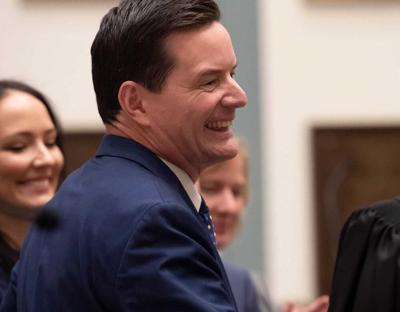DOVER, Del. (AP)- Delaware election officials have failed to take action as mandated by law against political candidates and committees who haven’t filed required campaign finance reports, but the scofflaws could escape liability under a new law effective Jan. 1.
A report recently submitted to the state Board of Elections shows candidates and committees owed more than $600,000 in fines for failing to file campaign finance reports just for the 2020 election cycle alone. More than $23,000 in additional uncollected fines were owed by candidates and committees who filed reports after the required deadlines.
The financial penalties for missing reports have only increased, however, because fines of $50 per day continue to accumulate until a report is filed.
Yet, the Department of Elections appears to have done little to try to collect the outstanding fines or to enforce the reporting requirements, other than to send periodic notices to candidates and committees. In those notices, however, the department acknowledges that it is required to refer violations to the attorney general’s office, which could result in misdemeanor criminal charges, if a report is not filed within 30 days of the due date.
Meanwhile, under the new law, campaign finance scofflaws could avoid having to pay hundreds of thousands of dollars in outstanding fines.
The legislation, which received only one dissenting vote in the General Assembly, eliminates the mandatory $50 daily fine and instead says the commissioner “may” issue a citation. A citation would carry a fine of $50 a day, along with mandated training for filing reports, but the maximum fine would be capped at 100 days, or $5,000.
The law also allows the elections commissioner, once a missing report has been filed, to negotiate a settlement of the outstanding fine, which could presumably include waiving a fine in its entirety. That provision is retroactive, meaning people who currently owe huge fines, some exceeding $100,000, could pay little or nothing.
The sponsor of the legislation, which was proposed by the Department of Elections, said allowing scofflaws to avoid fines was never his intent.
“They shouldn’t get off the hook, and the Department of Elections needs to be more aggressive in pursuing these.... It certainly was never my intent to help give someone a break who flagrantly disregarded the law,” said Sen. Trey Paradee, D-Dover.
Paradee said he was “shocked” and “disgusted” when told by The Associated Press about the unfiled reports and uncollected fines.
“I had no idea that you had committees that were just that far out of compliance,” he said.
As of last month, there were six cases in which pre-primary reports due in August and September of 2020, and six cases in which pre-general election reports due in October 2020, had not been filed. There were another 15 cases in which annual reports for 2020, which were due Jan. 20 of this year, had not been filed.
But the attorney general’s office has received only one campaign finance referral from the Department of Elections since Jan. 1, 2020, according to spokesperson Mat Marshall. Marshall also said the attorney general’s office was unaware of any pre-2020 referral, even though campaign finance documents show significant violations in previous years.
A political action committee called Citizens for a Better Wilmington, for example, filed a report that was due in August 2018 more than two years late, in November 2020. The resulting fine of $41,400 still has not been paid, according to the Department of Elections website.
Elections commissioner Anthony Albence declined several interview requests from the AP.
“The department is fully aware of the political committees ... that have failed to file required campaign finance reports, and is also aware of the amounts of outstanding fines owed by the political committees’ treasurers and/or candidates that have accrued due to non-filed (and late filed) campaign finance reports,” Albence wrote in a Nov. 18 email. “The department is working diligently to address and resolve these matters, while also simultaneously administering its many other priorities and responsibilities.”
Following the AP’s queries, however, Albence sent out new violation notices to several committees informing them he would refer their cases to the attorney general’s office “as required by law,” if the outstanding reports were not filed by Dec. 30.
Recipients also were told to contact the Department of Elections to arrange payments for outstanding fines.
“Your failure to resolve this outstanding indebtedness to the state may result in a collection action being filed against you in a Delaware court,” the letters added.
Targets of the letters include the Black Caucus PAC, which owed more than $140,000 as of mid-December; Va'Shun Turner, a former Wilmington councilman and 2020 city treasurer candidate who owed more than $144,000; and Ronnell Page, a former Wilmington council candidate who owed more than $120,000.
Black Caucus PAC founder Lovely Lacey, a former legislative aide who also worked for the Delaware Democratic Party and used the party’s headquarters as the mailing address for her and the PAC, did not respond to email and cellphone messages. Turner promised to call an AP reporter back but never did.
Page filed his three outstanding reports one day after The Associated Press questioned him.
“I’m totally blown away by this conversation,” said Page, adding he never received violation letters from the Department of Elections while acknowledging that his wife, who was his campaign treasurer, received two email reminders in January in advance of the deadline for the 2020 annual report.
“There’s gotta be something that can be done,” Page said of his outstanding fines. “That number is astronomical.”
Page could very well get his wish.
The Dec. 30 deadline mentioned in the latest violation notices is mere hours before the new reporting law takes effect.


